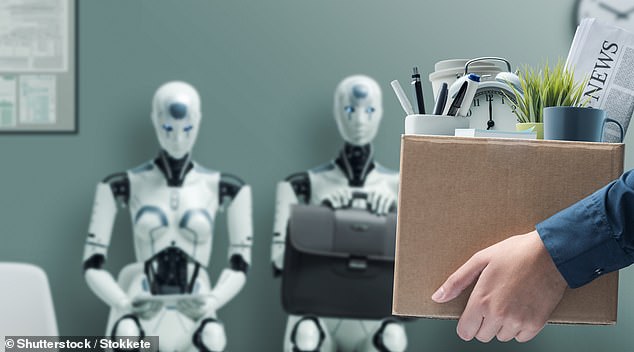To keep children from becoming the lost generation of workers, an expert has recommended that parents teach them to use AI at the age of six.
Ed Broussard, Managing director at Tomoro AI, helps companies navigate a market powered by artificial intelligence and has shared skills the younger generation will need to live in a world that is quickly being engulfed by it.
He told DailyMail.com parents should let their kids use chatbots like ChatGPT to make fun games, custom stories based on their ideas and to find answers to certain questions they often ask.
The AI expert has shared other skills children will need such as being able to think without the internet and focusing on jobs that do not currently exist.

To keep children from becoming the lost generation of workers, an expert has recommended that parents teach them to use AI at the age of six
‘I often joke with clients, the best person to hire into their firm is the person who just cheated on their university exams using AI – they’ve already learned how to use AI to get great results,’ said Broussard.
He added” ‘Employers of the future will need native AI users, where utilizing AI to work faster, better and smarter is second nature. But you can’t expect your kids to embrace AI unless you role model positive AI behaviors yourself.’
He recommends starting children with AI while they are in elementary school, saying the education system needs to also shift toward teaching the tech.

Ed Broussard (pictured above) is the managing director at the artificial intelligence company Tomoro AI
‘The jobs we will be doing will be completely different and require a different set of skills,’ Broussard said.
‘We need to be making that change now in our education systems, so we don’t produce a lost generation of workers with the wrong skills for the post-AI world’.
So what skills will be in demand in an AI-powered future?
Broussard explained that people skills like leadership and being able to think independently will still be valuable.
Being able to think without the internet
Many of us rely on Wikipedia, Google Maps or Google Search to find facts or directions.
A key skill in the world of tomorrow will be ‘outsourcing’ thinking to an AI, Broussard said.
‘The internet reduced the value and necessity to remember things, even things as simple as the directions home from their friend’s house,’ he continued.
‘One of the problems AI will bring is it goes beyond just giving information and can actually replace a lot of peoples’ thinking; by creating custom answers to very specific questions. As children adopt AI tools it is important that we also teach them how to think, and not outsource all of that thinking to AI.’
‘You can help your children by fostering their curiosity in the world.
‘Whenever your children ask how something works, or why it is, follow the thread, use YouTube, Google or even ChatGPT to start investigating how it works.
‘An understanding of how the world works will be vital in the future as more and more work is done by AI and people will need the knowledge to understand and challenge the output of AI systems.’

Artificial intelligence is projected to destroy many jobs this decade
Focus on jobs that don’t exist yet
‘Most young children at school today will do jobs that don’t exist yet,’ Broussard said.
The World Economic Forum estimated about 65 percent of kids entering primary school today will end up working in jobs that don’t currently exist.
‘Office jobs as whole won’t be redundant but they will become more about entrepreneurship, communication and directing teams (and AIs) to achieve tasks than repetitive completion of the tasks themselves,’ said Broussard.
‘That means memory and the ability to follow structured processes will become less important, but communication, problem solving, ideation and creativity will remain critical to a successful life.’
Learn a trade
Current jobs that require memory and training around facts and procedures, such as accounting, will diminish in value, Broussard explained.
‘More and more of those jobs are conducted by AI,’ he continued.
‘In a world of such uncertainty, planning skills for a specific career is probably not the route to take.
‘Encourage your kids to do what they love, but make sure they do it with AI as a companion and you’ll be setting them up for success,’ said Broussard
But setting children up for jobs such as teaching, nursing or trades could be useful, he explained.
‘Trades such as joinery, plumbing and electricians where hands-on applications and onsite problem-solving are required will be much less disrupted,’ said Broussard.








